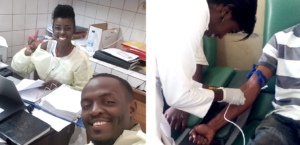Our hard work was rewarded with a 3-star accreditation by South African National Accreditation Society.
Yokyu Estel Tante is a Laboratory Scientist by training. Presently, she works in the field of Blood Safety and Blood Transfusion as a Quality Assurance Officer, providing technical assistance (mentoring) to blood services and diagnostic laboratories with the goal of being certified or accredited.
During her spare time, there are lot of fun things that she enjoys doing. Shopping, she says, is on the top of her list. She loves dancing and working out to music, especially Afro pop music. Through travelling and sightseeing, another hobby, she gets to meet and connect with people from diverse backgrounds, exchange ideas and learn from different cultures.
What led you to pursue a career in health?
My passion for caring and helping the sick is what made me venture into the health field. I was first captivated by the incidence of sickle cell anemia: the lack of awareness with respect to diagnosis and mode of transmission and how it could be prevented. I decided to pursue a master’s program in Biomedical Sciences: specializing in Hematology but then instead of Blood Disorders, Blood Transfusion caught my attention and so, here I am.
How would you describe your career path?
I would say my career path and professional journey has been “a roller coaster with a couple of punctuations.”
In 2012, after I obtained my MSc in Hematology and Blood Transfusion, I was contracted by the state government to work as a Lab Scientist at a Regional Hospital Lab and Blood Service. A few months later, I was appointed to head the blood service department. The Hospital Management at the time had enrolled the Laboratory and Blood Service for the Stepwise Laboratory Quality Improvement Process Towards Accreditation (SLIPTA) program. This was my first experience working to implement a quality management system. Initially, it was a tedious process with guidelines and the ISO15189 standards, given that it was a new concept. However, our hard work was rewarded with a 3-star accreditation by South African National Accreditation Society (SANAS). We became the first public Laboratory and Blood Service to be accredited and a model for other services around the country to emulate.
While working at the Regional Hospital, I offered lectures part-time at the state University to Medical Laboratory students and supervised them during their internships for a period of one year.
In 2016, my quest for excellence and drive to improve blood safety landed me a position as Blood Safety mentor with an NGO, Safe Blood for Africa (SBFA) Foundation, which entails implementing a quality management system (QMS) and accompanying blood services in acquiring certification/accreditation. So, my primary domain is quality assurance and quality systems, where I train personnel, provide mentoring, carry out audits, and monitor quality indicators among other duties.
What does a typical workday look like for you?
Meetings, Mentoring, Demonstration and Office work.
As a Blood Safety mentor, my role is to provide technical assistance at the Blood Service. A typical day would begin with prepping for activities of the day, followed by 2 hours of training for personnel (usually done twice a week) based on the monthly action plan. Then, I supervise the personnel at their individual posts and assist with the tasks assigned to them for the month – to ensure that procedures (SOP) are followed to the letter, take notes on gaps and training needs. Documentation is key in implementing a QMS, so I would usually have forms or standard operating procedures to write/edit or correct. This is followed by monitoring and evaluation of performance quality indicators to assess the level of progress. Once a week, we hold a quality meeting, chaired by the quality officer; during which, together with the heads of departments, non-conformities are assessed, solutions are proposed, and tasks distributed for personnel to ensure that the gaps are closed. I also write weekly reports of my activities, prepare PowerPoint presentations and demonstrations for upcoming training sessions.

What experience(s) are you most proud of?
When I look back at my journey so far, I am proud of a lot of my experiences but these two stand out for me:
My most memorable experience of which I am very proud of is the certification of the Blood Service at the Central Hospital in Yaoundé, Cameroon. I was assigned the role of Blood Safety mentor to provide technical assistance, implement the quality management system and accompany the staff through the Stepwise Accreditation Program (SWAP) of the African Society for Blood Transfusion (AfSBT). My mission was to get the blood service certified for Step 1 of the SWAP program in under 10 months.
With a team of 26 personnel, including three medical doctors, lab scientists, lab technicians and psycho-social agents, we worked on the organizational structure of the service, documentation, equipment calibration, maintenance and charting. I performed a series of bimonthly training sessions, competency assessment for personnel, client satisfaction survey, and staff coaching. It took a lot of devotion and putting in extra time to catch up with chores in addition to the usual routine of the staff. During the baseline assessment, the Blood Service had attained less than 20% of the standards. By the final assessment, we earned the 100% mark and became the first Blood Service in West and Central Africa to be certified by AfSBT. This is my greatest achievement in the life of my career.
To be continued in Part 2…
